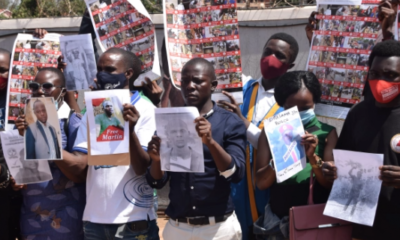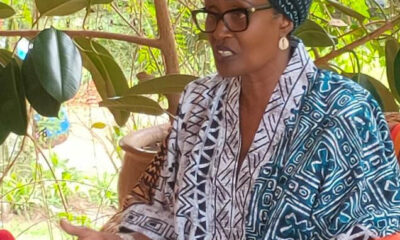
FAO regional workshop seeks to strengthen role of MSMEs in improving food environment
Stakeholders in a group photo at the workshop opening day in Entebbe (PHOTO/Nelson Mandela).ENTEBBE, Uganda – The Food and Agriculture Organization of the United Nations (FAO) Sub-Regional Office for Eastern Africa is hosting a two-day regional workshop at Imperial Gold View Hotel Entebbe. The event aimed to strengthen the role of Micro, Small and Medium Enterprises (MSMEs) in improving the food environment through better food packaging and labeling.Speaking at the opening of the workshop on Monday, Dr. Antonio Querido, FAO Representative in Uganda, highlighted the significance of food packaging and labeling in shaping consumer choices and behavior.“Food packaging and labeling are critical communication tools for consumers, influencing their decisions and habits,” he said.Querido noted that non-regulated food environments expose populations to unhealthy diets, increasing the risk of related diseases and mortalities.“Proper food packaging and labeling can nurture healthy eating habits, inform food regulations, and align public policies with education programs,” he emphasized.He says food packaging and labeling are essential communication tools for consumers, influencing their choices and behavior which aligns with the commitment made by Ethiopia, Uganda, and Kenya during the 2021 UN Food Systems Summit in New York to improve access to healthy and safe diets.“Our project aims to enhance nutrition outcomes in the IGAD region by strengthening the capacity of Small and Medium Enterprises (SMEs) to implement responsible food packaging and labeling. We’ve engaged stakeholders in the three countries to identify gaps and challenges in food standards and recommend solutions.”Querido notes that in Uganda, urbanization, population growth, and increased disposable income have led to a surge in consumption of processed and unhealthy food.“Inadequate food packaging and labeling have resulted in unhealthy levels of salts, free sugars, saturated and trans fats in fast convenient foods. A 2020 study found that 86% of food adverts in Kampala schools promoted unhealthy foods, increasing the risk of Non-Communicable Diseases (NCDs).”The prevalence of hypertension and diabetes among adults is rising, with women having a higher prevalence. Currently, 33% of annual deaths in Uganda are attributed to NCDs.He underscored that proper food packaging and labeling can nurture healthy eating habits and lifestyles through education and informed food choices. Standard labeling and advertising can guide the food industry on product reformulation and provide consumers with relevant information.He said that in line with the African Continental Free Trade Area (AfCFTA) agreement, supporting regulations related to food packaging and labeling will be critical in promoting economic growth and lifting 30 million Africans out of extreme poverty.Mr. Fred Ahimbisibwe, Commissioner in charge of food trade at the Ministry of Trade said that (MSMEs) are the backbone of Uganda’s economy, and their contribution to enhancing regional trade for agro-food commodities cannot be overstated.“As we strive to achieve the goals of the African Continental Free Trade Area (AfCFTA), MSMEs will play a pivotal role in boosting intra-African trade and economic growth.”However, he noted that to fully participate in regional and international trade, Ugandan MSMEs must meet stringent packaging requirements. “This is non-negotiable. The implementation of regulations related to food packaging, labeling, and health will be critical for SMEs to compete effectively in the AfCFTA market.”To support MSMEs, said stakeholders must enhance their capacity in the food and agricultural sector including access to better packaging materials, improved labeling, and adherence to ethical and environmentally friendly practices.“By doing so, we can ensure; sustainable healthy diets for all Ugandans, increased tax revenue through compliant businesses, and environmental conservation through responsible packaging practices.”Ahimbisibwe called for prioritization of sustainability to ensure that packaging materials are recyclable and reusable to minimize waste and mitigate the environmental impact of our agricultural sector.Ms. Namusoke Samalie, Assistant Commissioner of Health Services at the Ministry of Health, emphasized the vital role MSMEs play in Uganda’s food systems.“These businesses drive local agriculture, process raw materials, and produce fortified foods that contribute to better nutrition and food security. Thanks to MSMEs, Uganda has made significant strides in transforming raw agricultural products into safe, affordable, and nutritious foods, positively impacting local and regional food environments.”She highlighted Uganda’s commitment to food systems as;Scaling up breastfeeding and optimal complementary feeding practices.Enforcing regulations on marketing breastmilk substitutes.Expanding the Baby-Friendly Health Facility Initiative (BFHI).Fortifying staple foods to address micronutrient deficiencies, andPromoting healthy eating and lifestyles through presidential initiatives.“By strengthening the regulatory environment, empowering MSMEs, and improving labeling practices, Uganda aims to enhance food security, boost regional trade, and create economic opportunities, particularly for youth.”“These efforts are critical to achieving Sustainable Development Goals (SDGs) 2 and 3, ending hunger and ensuring healthy lives.”Ms. Nassali Hudah Tamale, Secretary General of the Institute Packaging Partners of Uganda, highlighted the significance of packaging for entrepreneurs, but also noted the challenges that hinder its effective use.The primary obstacle, she said is the high cost of packaging materials, exacerbated by manufacturers’ requirement for large minimum order quantities, which is unfeasible for MSMEs.“The high cost of packaging materials forces MSMEs to rely on resellers, who buy in bulk and sell in smaller quantities, making customization impossible.”She also decried policy barriers noting that the Ugandan government’s tax on imported paper, aimed at promoting local production, limits variety and increases production costs for MSMEs seeking specialized packaging materials.“Local paper producers in Uganda often don’t offer the desired variety, such as virgin paper, making it difficult for MSMEs to access suitable packaging products.”Nassali says to overcome these challenges, it’s essential to address the policy and regulatory environment, as well as provide support for MSMEs to access affordable and customizable packaging solutions. This could involve initiatives such as tax exemptions or reductions for importing specialized packaging materials, or programs to help MSMEs access financing for packaging needs.Additionally, she called for fostering partnerships between MSMEs, packaging manufacturers, and government agencies to help bridge the gap in accessing suitable packaging materials and promote the growth of the MSME sector in Uganda.Some statistics mentioned include:Food and Nutrition Situation2022 estimates show an 11% increase in the cost of a healthy diet compared to 2021.35.5% of the global population, or 28.3 billion people, cannot afford a healthy diet.924.8 million people in Africa face this challenge, an increase of 24.6 million from 2021.Child and Adult Overweight and ObesityThe global prevalence of overweight has stagnated at 5.6%.By 2030, 5.7% of children under five are projected to be overweight.Adult obesity has increased from 12.1% in 2012 to 15.8% in 2022.The workshop aimed to build consensus, identify areas for capacity-building, and work towards stronger, more sustainable food systems that meet the nutritional needs of all people, aligning with the Sustainable Development Goals (SDGs).The FAO, in partnership with the Ugandan government, the private sector, and other stakeholders, pledged to continue to support MSMEs in improving food packaging and labeling, promoting healthy diets, and enhancing trade in Africa.The regional workshop marked a crucial step towards strengthening the role of MSMEs in improving the food environment in Uganda and Eastern Africa. By addressing challenges and leveraging opportunities, stakeholders can work together to create a more sustainable, equitable, and healthy food system for all.Relatedhttps://www.pmldaily.com/business/agriculture/2024/09/fao-regional-workshop-seeks-to-strengthen-role-of-msmes-in-improving-food-environment.html
News
Ugandan Citizen Abducted, Held in Secret Detention for Three Months, Sparks Outrage and Calls for Justice

A disturbing new case of unlawful detention has surfaced, highlighting the ongoing human rights crisis in Uganda. A Ugandan citizen was reportedly abducted and held in a secret facility, known as a “safe house,” for three months, only to be released without charge or explanation. This incident, reported by NTV Uganda, has sparked widespread condemnation and renewed calls for accountability regarding human rights abuses in the country.
While the details surrounding the abduction remain unclear, reports indicate that the individual was taken without due process and held incommunicado—an action that has long been condemned by human rights organizations. The victim’s release, with no charges filed and no clear justification, has angered activists and citizens, who view this as yet another case of egregious abuse of power by the state.
“This is a recurring pattern,” said one human rights activist. “Abductions, secret detentions, and unexplained releases have become all too common in Uganda. These acts violate fundamental human rights and erode public trust in the justice system.”
The use of “safe houses,” unregistered detention facilities reportedly operated by security forces, has been a focal point in numerous allegations of torture and illegal imprisonment. Despite repeated calls from both local and international organizations for their closure and accountability for those involved, little action has been taken to address these violations.
This case underscores the urgent need for reform within Uganda’s security apparatus and greater accountability for human rights abuses. Observers hope that drawing attention to these injustices will spur concrete action to bring those responsible to justice and ensure the protection of basic human rights.
As frustration mounts, calls for both domestic and international pressure to hold the government accountable for such crimes grow louder. “One day, there must be accountability for all these crimes against our people,” stated one social media user, reflecting the sentiments of many Ugandans.
News
NUP Gathering Disrupted: Kyagulanyi Alleges Security Force Harassment and Arrests

National Unity Platform (NUP) President Robert Kyagulanyi has accused Ugandan security forces of using excessive force to disrupt a planned NUP gathering. The allegations were detailed in a statement shared on Twitter, following an event held to honor children of NUP supporters who were killed, disappeared, or detained for their political beliefs.
According to Kyagulanyi, security personnel, under the command of an officer identified as Asiimwe, carried out a preemptive operation early in the morning upon learning of the NUP’s plans. The forces allegedly stormed the premises, arrested workers, and deployed tear gas to disperse those present.
“The criminals under the command of one Asiimwe deployed early morning, arrested our workers, and threw tear gas into our premises. They’ve cordoned off the premises and blocked all people from accessing the place,” Kyagulanyi wrote.
Among those reportedly arrested were Saava Peter, Mudenya Samson, and Turyasingura Samson. Kyagulanyi claimed the detained workers were subjected to beatings and interrogated about their political affiliations, with security operatives labeling them as terrorists.
“These JATT operatives asked the workers who they support politically, branding them terrorists and criminals—their only crime being that they work with us. You can imagine the indignity!” Kyagulanyi lamented.
This incident adds to the growing tension in Uganda’s political climate, where opposition parties frequently accuse the government of stifling dissent. Despite the challenges, Kyagulanyi ended his statement with a message of defiance and optimism, proclaiming, “UGANDA WILL BE FREE.”
NUP Gathering Disrupted: Kyagulanyi Alleges Security Force Harassment and Arrests
News
Sudan Demands Apology from Uganda Over Army Chief Muhoozi Kainerugaba’s Threat to Invade Khartoum

Sudan has demanded an official apology from Uganda over “offensive and dangerous” comments made by the chief of Uganda army staff, who threated to invade Khartoum, the Sudan Tribune has reported.
General Muhoozi Kainerugaba, son of Ugandan President Yoweri Museveni and CDF of the Ugandan army, posted two comments on the X platform on Tuesday in which he threatened “to capture Khartoum” with the support of the US President elect Donald Trump after he takes office. The posts were deleted later.
“The government of Sudan demands and official apology from the Ugandan government for the offensive and dangerous comments of the army commander,” Sudan’s foreign ministry said in a statement that the Sudan Tribune said it has seen.
Sudan Demands Apology from Uganda Over Army Chief Muhoozi Kainerugaba’s Threat to Invade Khartoum
-

 News22 hours ago
News22 hours agoUgandan Citizen Abducted, Held in Secret Detention for Three Months, Sparks Outrage and Calls for Justice
-

 News22 hours ago
News22 hours agoNUP Gathering Disrupted: Kyagulanyi Alleges Security Force Harassment and Arrests
-

 News23 hours ago
News23 hours agoUganda Law Society to Establish Independent Commission to Combat Judicial Corruption and Restore Accountability
-

 News23 hours ago
News23 hours agoSudan Demands Apology from Uganda Over Army Chief Muhoozi Kainerugaba’s Threat to Invade Khartoum
-

 News23 hours ago
News23 hours agoGhana Supreme Court Dismisses Challenges Against Anti-LGBTQ+ Bill
-

 News23 hours ago
News23 hours agoWinnie Byanyima Vows to Camp at Luzira Prison if Denied Access to Besigye







